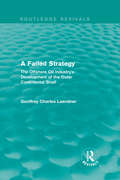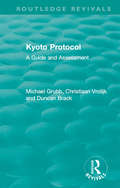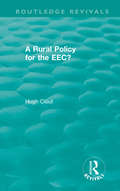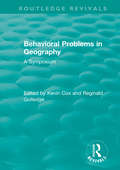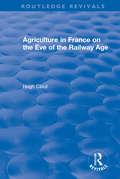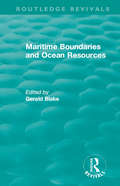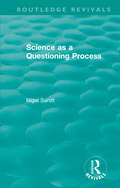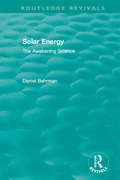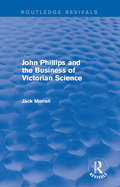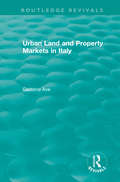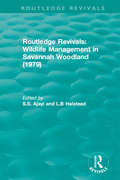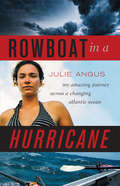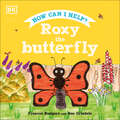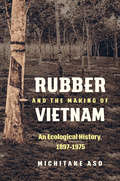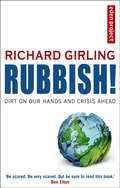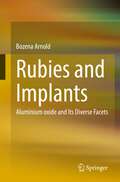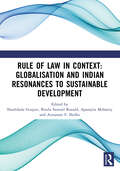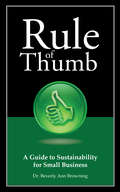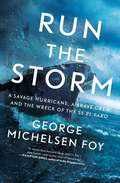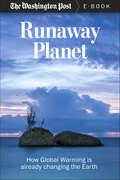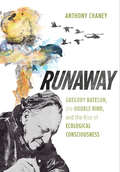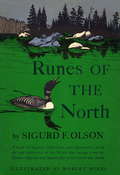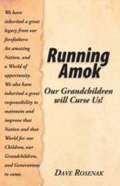- Table View
- List View
Routledge Revivals (1993): The Offshore Oil Industry's Development of the Outer Contintental Shelf
by Geoffrey C. LaendnerFirst published in 1993, this book traces and analyses the changing policies of American offshore oil companies concerning the exploration and development of the Outer Continental Shelf in the period from 1970 to 1976 — covering environmental legislation, the oil embargo, presidential initiatives, and proposed international laws. Where previous studies concerning the Outer Continental Shelf had only examined broad policy issues on an international level, this study focuses on those American offshore companies who were major actors in ocean affairs, especially in the exploration and development of the region.
Routledge Revivals: A Guide and Assessment (Routledge Revivals)
by Michael Grubb Duncan Brack Christiaan VrolijkOriginally published in 1999, The Kyoto Protocol provides a detailed discussion on the history, terms and implications of the Kyoto Protocol 1997. It explains the meaning of provision on emissions trading and other flexibility mechanisms, and provides a quantitative analysis using the Energy and Environment Programme's emissions trading model. It also contains the full text of the Kyoto Protocol and developments at the 4th Conference of the Parties in December 1998. This book will be of interest to academics working in the field of climate change, as well as the broader area of environment and sustainability.
Routledge Revivals: A Rural Policy for the EEC (Routledge Revivals)
by Hugh CloutFirst published in 1984, Hugh Clout’s work contributes to one of the most debated and important topics of the time, the European Economic Community. Starting from the Mid-20th century, Clout explains the profound socio-economic and environmental changes that effected the countryside of Western Europe. This work shows how the EEC’s wide-ranging Common Agricultural Policy added a measure of uniformity to farm policies. Clout reveals that the transformation however was not an entirely healthy one. The broad process of agricultural modernisation reinforced the numerical decline of farm workers throughout Western Europe, weakened many rural communities, and served to accentuate depopulation. Clout’s work ultimately argues forcibly that to produce such a programme for managing rural Europe would be a major challenge for the EEC in the future.
Routledge Revivals: A Symposium (Routledge Revivals #6)
by Kevin R. Cox Reginald G. GolledgeOriginally published in 1969, Behavioral Problems in Geography unpacks and identifies elements of behavioral models and theories. The book seeks to examine their specific effects on spatial activity and to operationalize some of the concepts previously used in a subjective and descriptive manner. All papers, are united by a common concern for the building of geographic theory regarding human behavior. Contributions in the volume vary a great deal in their emphasis ranging from philosophy and review, to theorizing and operationalization. Each paper recognizes the importance of examining the behavioural basis of spatial activity. This book will appeal to scholars of geography and psychology alike.
Routledge Revivals: Agriculture in France on the Eve of the Railway Age (Routledge Revivals)
by Hugh CloutFirst published in 1980, this compact and useful book uses the earliest volumes of government-published statistics, and with the aid of computer-generated cartography, transforms the numbers there reported into an arrondissement-by-arrondissement comparative picture of French agriculture in the mid-1830s. Clout reviews problems of rapid population growth, scarcely adequate domestic food supplies and primitive systems of transportation, while attention is drawn to spatial variations in agricultural activity and productivity. Commercial, high-yielding farming was best developed in a northern multi-nuclear region, comprising of Ile-de-France, Normandy and Nord, with smaller foci of commercial orientation along an eastern axis from Alsace to Marseilles and in western areas from the Loire to the middle of the Garonne valley. Clout concludes that the revolutionary promise of national economic unity was far from being realised in the 1830s and was not to be achieved until national systems of transport and education were firmly established later in the nineteenth century.
Routledge Revivals: Maritime Boundaries and Ocean Resources (Routledge Revivals)
by Gerald BlakeFirst published in 1987, Maritime Boundaries and Ocean Resources is a collection of essays which examines the political jurisdiction of ocean boundaries and the affects that this has on the world’s oceans. It examines how the intensification of ocean use has raised questions of how rational planning, and the management of the oceans can avoid increasingly environmental damage and sea use conflict and examines the ocean as a tool for space, trade and communication. It also addresses the creation of integrated regional planning for ocean management.
Routledge Revivals: Science as a Questioning Process (Routledge Revivals)
by Nigel SanittFirst published in 1996, Science as a Questioning Process evaluates scientific theories through from Darwinian evolution to relativity, and from quantum theory to cosmology. It offers an examination of these theories, in terms of a compromise between resolvable empirical questions, and theoretical questions left unresolved. The book asks questions that deal with both intellectual and public concern about what science tells us, and how reliable it is. Through this novel perspective, the book examines science in the context of everyday culture and the role it plays in everyday life. This book will be of interest to anyone working in the fields of philosophy, sociology and science.
Routledge Revivals: The Awakening Science (Routledge Revivals)
by Daniel BehrmanOriginally published in 1979, Solar Energy provides a tour of the world of solar energy and asks two key questions: is solar energy the key to the future of our energy needs, and what are the facts and potential of this source of renewable power. The book examines solar energy from the past, to modern plans for designing domestic solar housing, and looks at the sites and the technology applied to harness the Sun's power, such as the energy potential of windmills and the equatorial oceans. Behrman reports on the progress of scientists and manufacturers in making solar energy a viable competitor in the energy market, and studies the projections of a future energy crop for energy plantations.
Routledge Revivals: The Fiction of the Brotherhood of the Rosy Cross (Routledge Revivals)
by Jack MorrellFirst published in 2005, this book represents the first full length biography of John Phillips, one of the most remarkable and important scientists of the Victorian period. Adopting a broad chronological approach, this book not only traces the development of Phillips’ career but clarifies and highlights his role within Victorian culture, shedding light on many wider themes. It explores how Phillips’ love of science was inseparable from his need to earn a living and develop a career which could sustain him. Hence questions of power, authority, reputation and patronage were central to Phillips’ career and scientific work. Drawing on a wealth of primary sources and a rich body of recent writings on Victorian science, this biography brings together his personal story with the scientific theories and developments of the day, and fixes them firmly within the context of wider society.
Routledge Revivals: Urban Land and Property Markets in Italy (Routledge Revivals)
by Gastone AveOriginally published in 1996, Urban Land and Property Markets describes the intricacies of the Italian urban planning system, and the interconnections between the property sector, the national economy, and recent historical developments, including the new challenges facing Italy after the early 1990s collapse of the party system. The book’s underlying thesis is that property values are ultimately created by urban planning and investment in infrastructure. Negotiations between local government and developers focus on three basic issues: the ultimate use of urban land, the quantitative control of development via planning permissions relating to city master plans, and the nature of public investment to support growth and property values.
Routledge Revivals: Wildlife Management in Savannah Woodland (Routledge Revivals)
by S.S. Ajayi and L.B. HalsteadOriginally published in 1979, Wildlife Management in Savannah Woodland provides a multidisciplinary approach to the environment. Developed by local scientists with a deep knowledge and understanding of the local situation, the book provides a pragmatic and realistic approach to West African conditions.
Rowboat in a Hurricane: My Amazing Journey Across a Changing Atlantic Ocean
by Julie AngusAn intrepid scientist and her fiancé—National Geographic's 2007 Adventurers of the Year—observe the changing ocean while rowing across the Atlantic. In 2005-06, Julie Angus and her fiancé Colin rowed 10,000 kilometers across the Atlantic Ocean—from Lisbon to Costa Rica—making Angus the first woman in the world to travel from mainland to mainland in a rowboat. The 145-day journey gave Angus, a trained biologist, a unique perspective on the ocean. The slow-moving boat became an ecosystem unto itself, attracting barnacles, dorado fish, trigger fish, turtles, sharks, whales, birds, and more, which she was able to observe and document. Angus also saw unmistakable signs of the ocean&’s devastation, with far more plastic bottles, wrappers, toys, and bags than sharks or other once-common sea life. Four cyclones, including two hurricanes, hammered the small boat so intensely that Angus and her companion weren't sure they would survive. Rowboat in a Hurricane records this amazing journey in meticulous, dramatic detail, in the process offering a personal record of an awe-inspiring ecosystem, its fascinating denizens, and the mounting threats to its existence.
Roxy the Butterfly (Roly and Friends)
by Frances RodgersA delightful picture book that informs young readers of how they can help the butterflies that like to visit their backyard Step outside and find out about how you can help the adorable animals that like to visit your garden. Little ones will love following Roxy the Butterfly as she sets off burrowing around your backyard garden, finding wonderfully colorful flowers to feed on and a cozy bug hotel to rest in after a long, hard day of exploring. But with bumps along the way, she&’ll need your help, will you volunteer as her little helper? This sweet picture book gently introduces young readers to the idea of animal conservation and protection. Bursting with fun trivia, little ones will learn how unique butterflies are, and what makes them worth preserving. There are plenty of tips and tricks on how we can care for garden-dwelling friends like Roxy to keep them safe from the dangers they may face. No one is too young to start making a difference. Roxy the Butterfly is the perfect gift for any small-animal lover, or budding environmentalist, and will inspire toddlers to discover what is unseen in their gardens.
Rubber Boots Methods for the Anthropocene: Doing Fieldwork in Multispecies Worlds
by Nils Bubandt Astrid Oberborbeck Andersen Rachel CypherA methodological follow-up to Arts of Living on a Damaged Planet The environmental and climatic crises of our time are fundamentally multispecies crises. And the Anthropocene, a time of &“human-made&” disruptions on a planetary scale, is a disruption of the fabric of life as a whole. The contributors to Rubber Boots Methods for the Anthropocene argue that understanding the multispecies nature of these disruptions requires multispecies methods.Answering methodological challenges posed by the Anthropocene, Rubber Boots Methods for the Anthropocene retools the empirical study of the socioecological chaos of the contemporary moment across the arts, human science, and natural science. Based on critical landscape history, multispecies curiosity, and collaboration across disciplines and knowledge systems, the volume presents thirteen transdisciplinary accounts of practical methodological experimentation, highlighting diverse settings ranging from the High Arctic to the deserts of southern Africa and from the pampas of Argentina to the coral reefs of the Western Pacific, always insisting on the importance of firsthand, &“rubber boots&” immersion in the field.The methodological companion to Arts of Living on a Damaged Planet: Ghosts and Monsters of the Anthropocene (Minnesota, 2017), this collection puts forth empirical studies of the multispecies messiness of contemporary life that investigate some of the critical questions of our time.Contributors: Filippo Bertoni, Museum für Naturkunde, Berlin; Harshavardhan Bhat, U of Westminster; Nathalia Brichet, U of Copenhagen; Janne Flora, Aarhus U, Denmark; Natalie Forssman, U of British Columbia; Peter Funch, Aarhus U; Kirsten Hastrup, U of Copenhagen; Colin Hoag, Smith College; Joseph Klein, U of California, Santa Cruz; Andrew S. Mathews, U of California, Santa Cruz; Daniel Münster, U of Oslo; Ursula Münster, U of Oslo; Jon Rasmus Nyquist, U of Oslo; Katy Overstreet, U of Copenhagen; Pierre du Plessis, U of Oslo; Meredith Root-Bernstein; Heather Anne Swanson, Aarhus U; Anna Lowenhaupt Tsing, U of California,Santa Cruz; Stine Vestbo.
Rubber and the Making of Vietnam: An Ecological History, 1897–1975 (Flows, Migrations, and Exchanges)
by Michitake AsoDating back to the nineteenth-century transplantation of a latex-producing tree from the Amazon to Southeast Asia, rubber production has wrought monumental changes worldwide. During a turbulent Vietnamese past, rubber transcended capitalism and socialism, colonization and decolonization, becoming a key commodity around which life and history have revolved. In this pathbreaking study, Michitake Aso narrates how rubber plantations came to dominate the material and symbolic landscape of Vietnam and its neighbors, structuring the region's environment of conflict and violence. Tracing the stories of agronomists, medical doctors, laborers, and leaders of independence movements, Aso demonstrates how postcolonial socialist visions of agriculture and medicine were informed by their colonial and capitalist predecessors in important ways. As rubber cultivation funded infrastructural improvements and the creation of a skilled labor force, private and state-run plantations became landscapes of oppression, resistance, and modernity.Synthesizing archival material in English, French, and Vietnamese, Aso uses rubber plantations as a lens to examine the entanglements of nature, culture, and politics and demonstrates how the demand for rubber has impacted nearly a century of war and, at best, uneasy peace in Vietnam.
Rubbish!: Dirt On Our Hands And Crisis Ahead
by Richard GirlingWe can no longer cope with our waste. Every hour in the UK we throw away enough rubbish to fill the Albert hall - a statistic quoted so often that perhaps we've stopped imagining what it means. And every year the flow accelerates.This is the story of our rubbish - from the first human bowel movement to the littering of outer space. With a hankerchief to his nose, Girling picks through our fridge mountain, our crumbling sewers, trading waste, packaging waste, hazardous industrial waste... it is a mucky saga of carelessness, greed and opportunism, wasted opportunity and official bungling. But Rubbish! is also a plea for us to consider other kinds of waste: the trashing of our landscape, the unstoppable floods of junk that clog our mailboxes, litter the skies and foul the airwaves...Rubbish! may not be a conventional battle cry but this is unmistakably a call to arms - not just for the three 'R's - reduce, re-use, recycle - but for us to fight for new ideas, brave initiative rather than reliance on old systems that are crumbling before our eyes.
Rubies and Implants: Aluminium oxide and Its Diverse Facets
by Bozena ArnoldA material that enchants us as ruby or sapphire and is applied in watches or lasers.A material that gives us a better life in the form of implants.A material that provides irreplaceable technical services with its hardness and heat resistance.A fascinating material. Its name is aluminium oxide.In this book you will find a lot of exciting and often astonishing information about this extraordinary material. First, the necessary facts about the substance aluminium oxide are given. Then the world of the gemstones ruby and sapphire is described. And finally, the world of alumina as well as technical ceramics is illuminated.
Rule of Law for Nature
by Christina Voigt'Human laws must be reformulated to keep human activities in harmony with the unchanging and universal laws of nature. ' This 1987 statement by the World Commission on Environment and Development has never been more relevant and urgent than it is today. Despite the many legal responses to various environmental problems, more greenhouse gases than ever before are being released into the atmosphere, biological diversity is rapidly declining and fish stocks in the oceans are dwindling. This book challenges the doctrinal construction of environmental law and presents an innovative legal approach to ecological sustainability: a rule of law for nature which guides and transcends ordinary written laws and extends fundamental principles of respect, integrity and legal security to the non-human world.
Rule of Law in Context: Globalisation and Indian Resonances to Sustainable Development
by Shashikala Gurpur Aparajita Mohanty Bindu Samuel Ronald Atmaram F. ShelkeSymbiosis Conference on Rule of Law in Context (SYMROLIC) represents the point of arrival of Faculty of Law, SIU to maturity with its own imprint in the world of legal research. It is an interdisciplinary conference which emphasizes Law & Life Interface in the spheres of Innovation, Science, Technology, Management, Human Behavior, Global Policy, Governance and Climate Change.Among the special features of this conference are the Plenary Session and Track 4 – which focus on Legal Road to Sustainable Development Goals: Global and Indian Route and EU Climate Justice Law, Governance, Management and Policy, respectively. The conference along with other tracks will also have a track on European Legal StudiesIn line with the lead research trends, this conference addresses the need for narrowing the gap between the idea and reality of a rule of law society.
Rule of Thumb: A Small Business Guide To Sustainability (Rule of Thumb #5)
by Dr Beverly BrowningReal world and commonly understood examples and experiences help the reader identify strengths which underscore a healthy marketing business plan and mistakes to avoid. Rules of Thumb throughout create easy to remember and apply fundamental principles and guideposts along the marketing journey.
Run the Storm: A Savage Hurricane, a Brave Crew, and the Wreck of the SS El Faro
by George Michelsen Foy“Here is the pitch-perfect pairing of subject and author, a gripping deconstruction of one of recent history’s most terrible and vexing sea tragedies…A meticulous forensic study that, in Foy’s able hands, rises to the level of literature.” —Hampton Sides “Fans of The Perfect Storm and Into Thin Air will love this exquisitely written and dramatic book. George Foy has an action story that doesn’t quit.” —Doug Stanton “Foy is an experienced mariner who clearly knows his stuff, which gives the reader confidence in his account, and allows us to get lost in an amazing story that builds to a wild finish.” —John U. Bacon In the bestselling tradition of The Perfect Storm and The Finest Hours, a harrowing true account of the mysterious disappearance of the SS El Faro, a gigantic American cargo ship that sank in the Bermuda Triangle, taking with it thirty-three lives.On October 1, 2015, the SS El Faro, a massive American cargo ship that made regular runs between Jacksonville, Florida and Puerto Rico, delivering everything from deodorant to new Chevrolets, disappeared in Hurricane Joaquin, a category 4 storm. The ship, its hundreds of shipping containers, and its entire crew plummeted to the bottom of the ocean, three miles down. The sinking was the greatest seagoing US merchant marine shipping disaster since World War II. The massive ship had a seasoned crew, state-of-the-art navigation equipment, and advance warning of the storm. It seemed incomprehensible that such a ship could sink so suddenly. How, in this day and age, could something like this happen? The answer is that a ship as large as the El Faro doesn’t vanish for just one reason; it vanishes because many factors intersect—everything from hurricane-tracking algorithms to the decay of rubber gaskets on hatches to the arcane science of loading cargo containers to the psychology of a powerful ship’s captain. All of these factors and more came into play in the sinking of the El Faro. Relying on Coast Guard inquest hearings as well as on numerous interviews, George Michelsen Foy has crafted a brilliant account that brings to life the final voyage of El Faro, a story that lasts only a few days but which grows almost intolerably suspenseful as deep-rooted flaws leading to the disaster inexorably link together and worsen. We see captain, engineers, and crew fight for their lives, and hear their actual words (as recorded on the ship’s black box) while the hurricane relentlessly tightens its noose around the ship. We watch, minute by minute, all that is happening on board—the ship’s mysterious tilt to one side, worried calls to the engine room, ship-to-shore reports, the courage of the men and women as they fight to survive, and the berserk ocean’s savage consumption of the massive hull. And through it all, the pain and ultimate resilience of the families of El Faro’s crew. Meticulous and absolutely thrilling, Run the Storm is a masterwork of stunning power.
Runaway Planet: How Global Warming is already changing the Earth
by The Washington PostSaving the world won't happen on the silver screen. In our fragile ecosystem, climate change is swiftly becoming the defining issue of how to prepare—and protect—the earth for the future. The climate change debate raged on in America in 2015, but the facts and the science now show irrefutably that our world is rapidly changing, and that irreparable damage has already begun. From rising sea levels to the spread of disease-carrying insects, from disappearing glaciers to the hottest temperatures ever recorded, climate change as a direct result of human beings’ actions affects everyone, and for many it is a matter of life or death. But progress is being made—with an historic United Nations meeting in Paris, with pledges by over one hundred countries to reduce emissions, with simple awareness. While many changes cannot be undone, great strides can still be made to stabilize regions most likely to be affected by climate change over the course of future generations. The Washington Post tackles this issue in vivid detail, profiling those who are at the forefront of the climate change debate—and those who are in the field, promoting the causes and doing the science that both warns and advocates for a safer tomorrow, for the earth and all its inhabitants.
Runaway: Gregory Bateson, the Double Bind, and the Rise of Ecological Consciousness
by Anthony ChaneyThe anthropologist Gregory Bateson has been called a lost giant of twentieth-century thought. In the years following World War II, Bateson was among the group of mathematicians, engineers, and social scientists who laid the theoretical foundations of the information age. In Palo Alto in 1956, he introduced the double-bind theory of schizophrenia. By the sixties, he was in Hawaii studying dolphin communication. Bateson's discipline hopping made established experts wary, but he found an audience open to his ideas in a generation of rebellious youth. To a gathering of counterculturalists and revolutionaries in 1967 London, Bateson was the first to warn of a "greenhouse effect" that could lead to runaway climate change.Blending intellectual biography with an ambitious reappraisal of the 1960s, Anthony Chaney uses Bateson's life and work to explore the idea that a postmodern ecological consciousness is the true legacy of the decade. Surrounded by voices calling for liberation of all kinds, Bateson spoke of limitation and dependence. But he also offered an affirming new picture of human beings and their place in the world—as ecologies knit together in a fabric of meaning that, said Bateson, "we might as well call Mind."
Runes of the North
by Sigurd F. OlsonIn Runes of the North Sigurd F. Olson explores the haunting appeal of the wilderness. He recounts how the legends of the northern vastness of Canada and Alaska have influenced him, weaving the tales and myths with his own stories and experiences as an explorer, writer, grandfather, and biologist. Now available in paperback for the first time, Runes of the North is a mystical and reflective guide to the northern wilderness written with a oneness and communion with nature that is unique to Olson's pen. It is a work filled with beauty, wisdom, and renewal.
Running Amok: Our Grandchildren Will Curse Us!
by Dave RosenakA Call to Action: The Whats, Wheres, Whys, and Hows for us as a Society to form a more Perfect Union and a Brighter Future.
